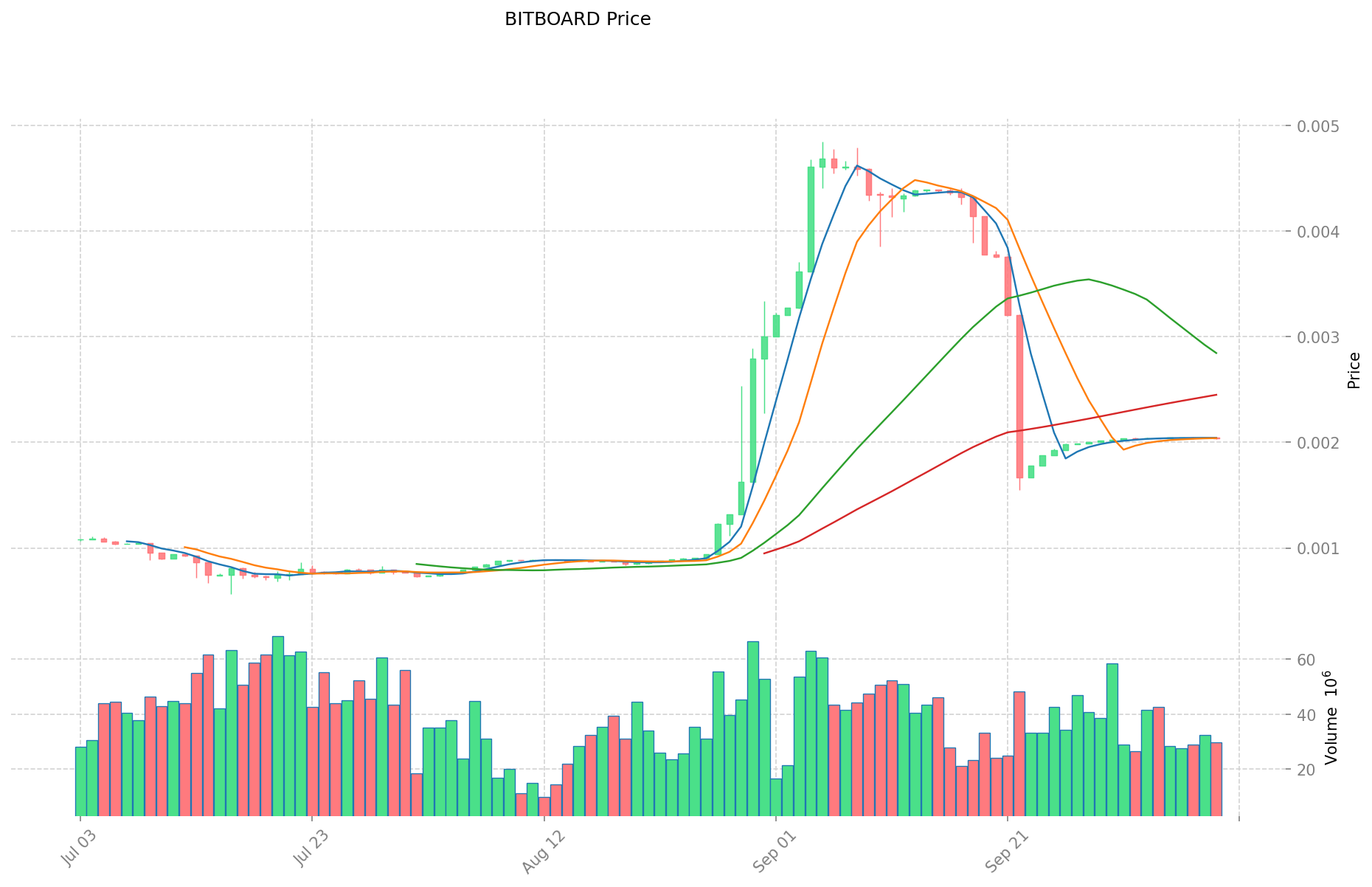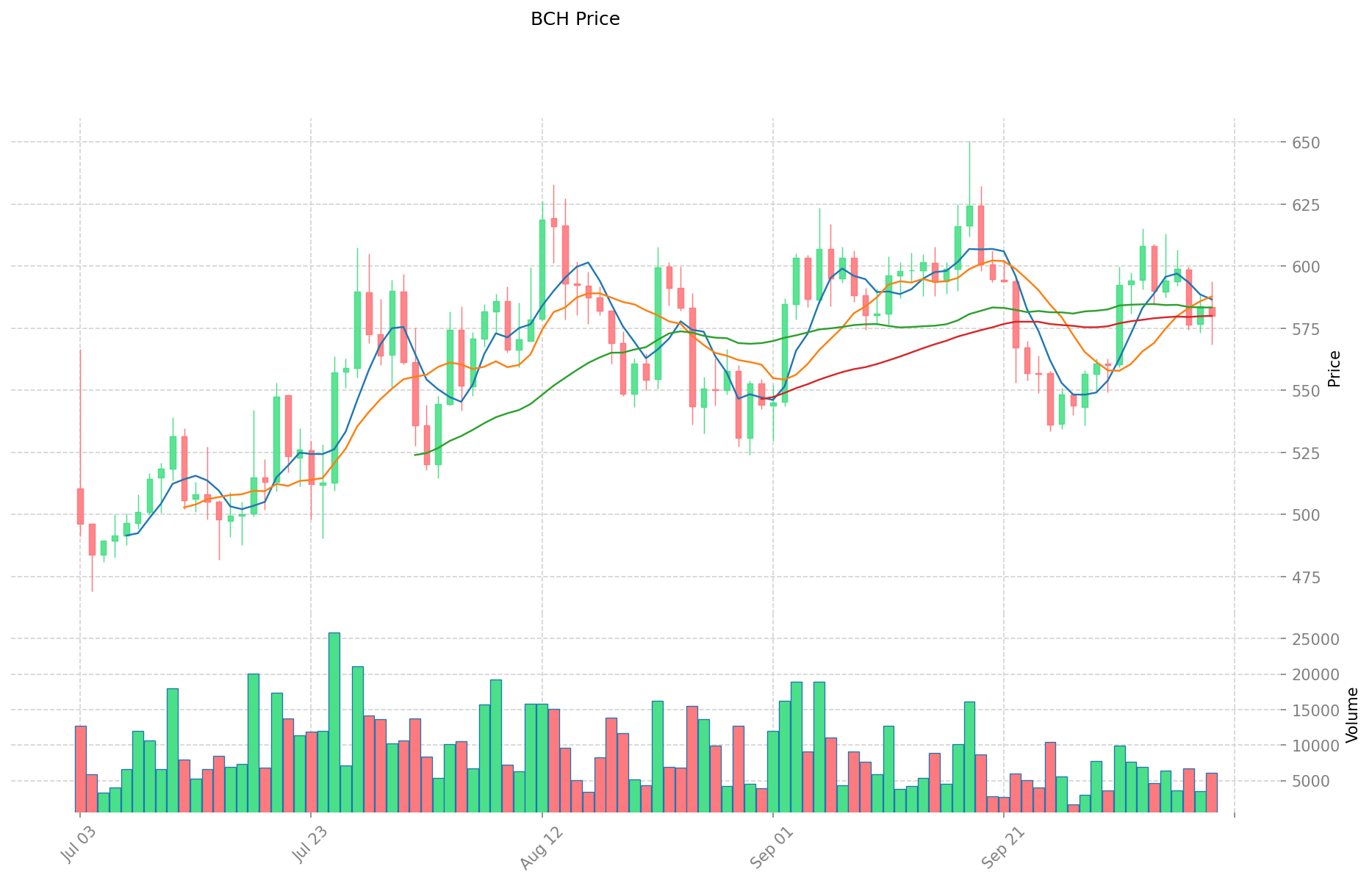BITBOARD vs BCH: The Battle for Cryptocurrency Supremacy in the Digital Age
Introduction: BITBOARD vs BCH Investment Comparison
In the cryptocurrency market, BITBOARD vs BCH comparison has always been a topic that investors cannot avoid. The two not only have significant differences in market cap ranking, application scenarios, and price performance, but also represent different positioning of crypto assets.
BITBOARD (BITBOARD): Since its launch, it has gained market recognition for its instant finality and high TPS that meets real-world use cases.
Bitcoin Cash (BCH): Since its inception in 2017, it has been hailed as a "peer-to-peer electronic cash system" following Satoshi's vision, and is one of the cryptocurrencies with the highest global trading volume and market capitalization.
This article will comprehensively analyze the investment value comparison between BITBOARD and BCH, focusing on historical price trends, supply mechanisms, institutional adoption, technological ecosystems, and future predictions, and attempt to answer the question that investors care about most:
"Which is the better buy right now?"
I. Price History Comparison and Current Market Status
BITBOARD (Coin A) and BCH (Coin B) Historical Price Trends
-
2024: BITBOARD reached its all-time high of $0.27 on December 7, 2024.
-
2025: BITBOARD hit its all-time low of $0.0000655 on March 13, 2025, showing significant volatility.
-
2017: BCH was created via a hard fork from Bitcoin on August 1, 2017, with an initial price of $555.89.
-
2017: BCH reached its all-time high of $3,785.82 on December 20, 2017.
-
2018: BCH hit its all-time low of $76.93 on December 16, 2018, demonstrating extreme market fluctuations.
-
Comparative analysis: In the recent market cycle, BITBOARD experienced a dramatic drop from its high of $0.27 to its current price of $0.0020374, a decline of over 99%. Meanwhile, BCH has shown more stability, currently trading at $580.98, which is significantly above its all-time low but still far from its all-time high.
Current Market Situation (2025-10-10)
- BITBOARD current price: $0.0020374
- BCH current price: $580.98
- 24-hour trading volume: BITBOARD $61,408.87 vs BCH $3,532,909.51
- Market Sentiment Index (Fear & Greed Index): 70 (Greed)
Click to view real-time prices:
- View BITBOARD current price Market Price
- View BCH current price Market Price


II. Core Factors Affecting Investment Value of BITBOARD vs BCH
Supply Mechanism Comparison (Tokenomics)
- BITBOARD: Fixed supply model with a cap of 21 million tokens, following Bitcoin's design
- BCH (Bitcoin Cash): Fixed supply model with a maximum of 21 million tokens and halving mechanism every 4 years, identical to Bitcoin's supply schedule
- 📌 Historical pattern: Both cryptocurrencies follow a similar supply schedule that creates scarcity over time, potentially driving price appreciation following halving events.
Institutional Adoption and Market Applications
- Institutional holdings: BCH has greater institutional presence with support from major exchanges and some investment products
- Enterprise adoption: BCH has gained more traction in merchant payments and cross-border transactions due to its focus on payment functionality and lower fees
- Regulatory attitudes: BCH generally faces similar regulatory treatment as Bitcoin across jurisdictions, while BITBOARD has less regulatory visibility
Technology Development and Ecosystem Building
- BCH technology upgrades: Regular protocol improvements focused on scaling, with increased block size (up to 32MB) enabling more transactions per second and lower fees
- BCH ecosystem development: Growing merchant adoption, payment processors, and some DeFi applications
- Ecosystem comparison: BCH has more established payment infrastructure and merchant adoption, while both have limited presence in DeFi and NFT markets compared to Ethereum and other smart contract platforms
Macroeconomic Factors and Market Cycles
- Performance during inflation: Both position themselves as potential inflation hedges, though BCH has longer market history
- Macroeconomic monetary policy: Interest rates and USD strength typically impact both assets similarly to other cryptocurrencies
- Geopolitical factors: BCH's focus on being "peer-to-peer electronic cash" positions it for cross-border transaction utility in restrictive jurisdictions
III. 2025-2030 Price Prediction: BITBOARD vs BCH
Short-term Prediction (2025)
- BITBOARD: Conservative $0.001365259 - $0.0020377 | Optimistic $0.0020377 - $0.002975042
- BCH: Conservative $313.6104 - $580.76 | Optimistic $580.76 - $638.836
Mid-term Prediction (2027)
- BITBOARD may enter a growth phase, expected price range $0.00189368860905 - $0.00293132620305
- BCH may enter a bullish market, expected price range $357.1891785 - $863.7483771
- Key drivers: Institutional capital inflow, ETF, ecosystem development
Long-term Prediction (2030)
- BITBOARD: Base scenario $0.001996341220717 - $0.003383629187657 | Optimistic scenario $0.003383629187657 - $0.003857337273929
- BCH: Base scenario $822.46427325438075 - $913.8491925048675 | Optimistic scenario $913.8491925048675 - $1325.081329132057875
Disclaimer: The above predictions are based on historical data and market analysis. Cryptocurrency markets are highly volatile and subject to various factors. These projections should not be considered as financial advice. Always conduct your own research before making investment decisions.
BITBOARD:
| 年份 | 预测最高价 | 预测平均价格 | 预测最低价 | 涨跌幅 |
|---|---|---|---|---|
| 2025 | 0.002975042 | 0.0020377 | 0.001365259 | 0 |
| 2026 | 0.00268181697 | 0.002506371 | 0.00155395002 | 22 |
| 2027 | 0.00293132620305 | 0.002594093985 | 0.00189368860905 | 27 |
| 2028 | 0.003121862406248 | 0.002762710094025 | 0.001961524166757 | 35 |
| 2029 | 0.003824972125177 | 0.002942286250136 | 0.001677103162577 | 44 |
| 2030 | 0.003857337273929 | 0.003383629187657 | 0.001996341220717 | 65 |
BCH:
| 年份 | 预测最高价 | 预测平均价格 | 预测最低价 | 涨跌幅 |
|---|---|---|---|---|
| 2025 | 638.836 | 580.76 | 313.6104 | 0 |
| 2026 | 689.07174 | 609.798 | 396.3687 | 4 |
| 2027 | 863.7483771 | 649.43487 | 357.1891785 | 11 |
| 2028 | 1044.096440499 | 756.59162355 | 643.1028800175 | 30 |
| 2029 | 927.354352985235 | 900.3440320245 | 702.26834497911 | 54 |
| 2030 | 1325.081329132057875 | 913.8491925048675 | 822.46427325438075 | 57 |
IV. Investment Strategy Comparison: BITBOARD vs BCH
Long-term vs Short-term Investment Strategies
- BITBOARD: Suitable for investors focusing on ecosystem potential and emerging technologies
- BCH: Suitable for investors seeking stability and potential inflation-hedge properties
Risk Management and Asset Allocation
- Conservative investors: BITBOARD: 10% vs BCH: 90%
- Aggressive investors: BITBOARD: 30% vs BCH: 70%
- Hedging tools: Stablecoin allocation, options, cross-currency portfolios
V. Potential Risk Comparison
Market Risk
- BITBOARD: Higher volatility and lower liquidity
- BCH: Susceptible to broader crypto market trends and Bitcoin price movements
Technical Risk
- BITBOARD: Scalability, network stability
- BCH: Mining centralization, potential security vulnerabilities
Regulatory Risk
- Global regulatory policies may impact both differently, with BCH potentially facing more scrutiny due to its larger market presence
VI. Conclusion: Which Is the Better Buy?
📌 Investment Value Summary:
- BITBOARD advantages: Potential for higher growth, emerging technology
- BCH advantages: Established market presence, wider adoption for payments
✅ Investment Advice:
- New investors: Consider a small allocation to BCH for exposure to the crypto market
- Experienced investors: Diversify between both, with a higher allocation to BCH
- Institutional investors: Focus on BCH due to its higher liquidity and established market presence
⚠️ Risk Warning: The cryptocurrency market is highly volatile. This article does not constitute investment advice. None
VII. FAQ
Q1: What are the main differences between BITBOARD and BCH? A: The main differences are: 1) Market cap and adoption - BCH has a larger market cap and wider adoption for payments. 2) Technology - BITBOARD focuses on instant finality and high TPS, while BCH aims to be peer-to-peer electronic cash with larger block sizes. 3) Price history - BCH has a longer price history dating back to 2017, while BITBOARD is newer. 4) Institutional presence - BCH has greater institutional support and trading volume.
Q2: Which cryptocurrency has shown better price stability? A: Based on historical data, BCH has demonstrated better price stability compared to BITBOARD. While BCH has experienced significant fluctuations, it is currently trading well above its all-time low. BITBOARD, on the other hand, has shown extreme volatility, dropping over 99% from its all-time high to its current price.
Q3: How do the supply mechanisms of BITBOARD and BCH compare? A: Both BITBOARD and BCH have a fixed supply model with a maximum cap of 21 million tokens. BCH follows Bitcoin's halving mechanism every 4 years, creating scarcity over time. This similarity in supply models means both cryptocurrencies have the potential for price appreciation due to increasing scarcity.
Q4: Which cryptocurrency is better suited for long-term investment? A: For long-term investment, BCH may be considered more suitable due to its established market presence, wider adoption for payments, and potential as an inflation hedge. However, BITBOARD could be attractive for investors focusing on emerging technologies and ecosystem potential. The choice depends on an investor's risk tolerance and belief in each project's future prospects.
Q5: What are the key risks associated with investing in BITBOARD and BCH? A: Key risks include: 1) Market risk - Both are subject to high volatility, with BITBOARD showing higher volatility and lower liquidity. 2) Technical risk - BITBOARD faces scalability and network stability challenges, while BCH has concerns about mining centralization. 3) Regulatory risk - Both may be impacted by global regulatory policies, with BCH potentially facing more scrutiny due to its larger market presence.
Q6: How do institutional adoption and market applications differ between BITBOARD and BCH? A: BCH has gained greater institutional adoption, with support from major exchanges and some investment products. It has also seen more traction in merchant payments and cross-border transactions due to its focus on payment functionality and lower fees. BITBOARD, being newer, has less institutional presence and regulatory visibility compared to BCH.
Q7: What investment strategies are recommended for BITBOARD and BCH? A: For conservative investors, a suggested allocation is 10% BITBOARD and 90% BCH. For aggressive investors, the recommendation is 30% BITBOARD and 70% BCH. New investors might consider a small allocation to BCH for crypto market exposure, while experienced investors could diversify between both, with a higher allocation to BCH. Institutional investors may focus more on BCH due to its higher liquidity and established market presence.
Share
Content